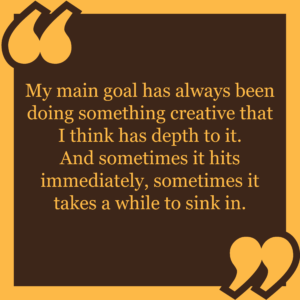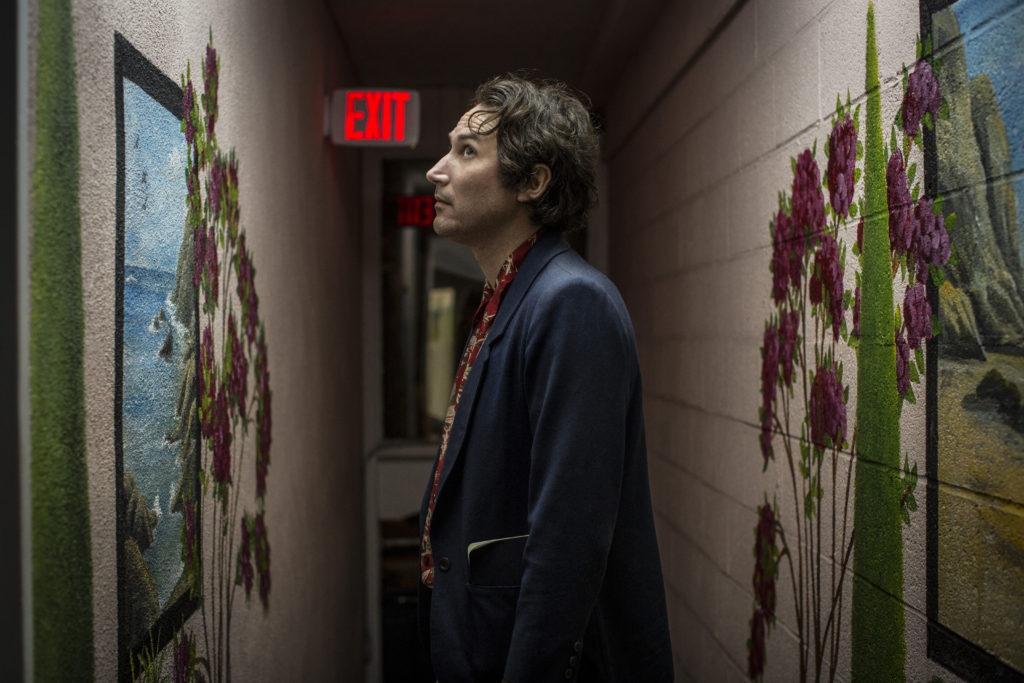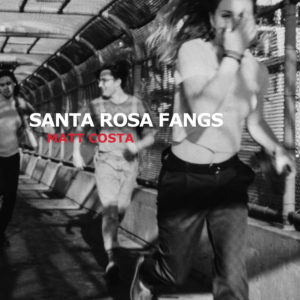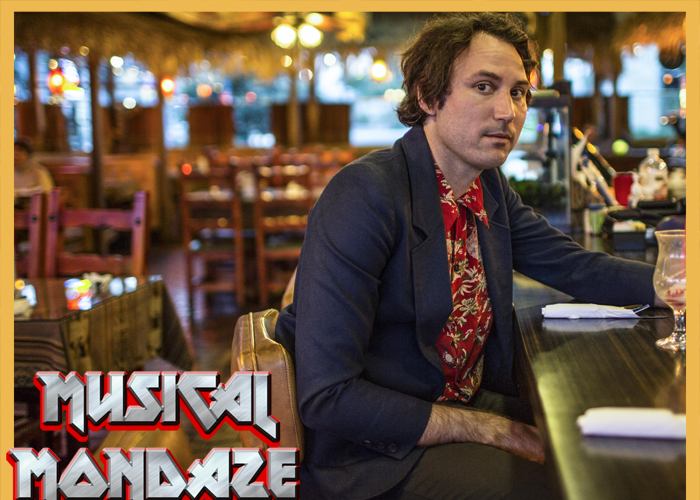
 Being such a visual person, singer/songwriter Matt Costa felt at home turning his latest album “Santa Rosa Fangs” into a sort of musical film, a cinematic soundtrack to three fictional characters who are coming of age while discovering that life is equal parts triumph and tragedy. Much of what is playing out in Costa’s captivating lyrics involve aspects of his own personal experiences, which he gifted to his trio of made-up muses and shaped into their shared story. The result is a record that, as a listener, feels timeless in its collective narrative and delivers on artistic layers that stretch deep beneath the surface.
Being such a visual person, singer/songwriter Matt Costa felt at home turning his latest album “Santa Rosa Fangs” into a sort of musical film, a cinematic soundtrack to three fictional characters who are coming of age while discovering that life is equal parts triumph and tragedy. Much of what is playing out in Costa’s captivating lyrics involve aspects of his own personal experiences, which he gifted to his trio of made-up muses and shaped into their shared story. The result is a record that, as a listener, feels timeless in its collective narrative and delivers on artistic layers that stretch deep beneath the surface.
We recently sat down with Costa to discuss the work that goes into an album after it’s finished, where he’s grown as an artist since his last full length release five years ago, and which “Santa Rosa Fangs” character he feels closest to.
TrunkSpace: “Santa Rosa Fangs” drops tomorrow. As you gear up to release new material to the world, what emotions do you juggle with, especially in a case like this where it’s been five years since your last full length album.
Costa: Well, there’s a lot of that goes into the feelings around releasing something, especially when it’s been a long time since I’ve done a proper full length release. I think that over the years though, I’ve gotten better at sort of managing my creative time and creative emotions with it. I finished the record in… it takes time for stuff to be put out. It takes about a year when you finish recording it, going through all the processes and everything for it to get put out, so it’s been awhile since I’ve recorded it. But since then, there’s been a lot put into sort of living in the songs – bringing them to life and getting ready to bring them to the road – which is a different thing than being creative in the writing time. Ideally, the song is a vehicle to kind of channel the ether. So it’s just kind of getting into that and then be able to go on the road and be able to really live inside the songs and bring people into them as well, rather then just having them live in their recorded form.
TrunkSpace: Is it difficult to manage the expectations associated with a release once it is out of your hands – basically, how it will be accepted and perceived once out in the world?
accepted and perceived once out in the world?
Costa: No, I don’t think so. Obviously you get – being in the music business or industry – those people who are invested in it just on the business end of it. My main goal has always been doing something creative that I think has depth to it. And sometimes it hits immediately, sometimes it takes a while to sink in. I’m just really happy to have the opportunity this time, or anytime, that I’m able to put a record out with support, in order to have it reach more people. So I think that, in itself, is a luxury.
TrunkSpace: As mentioned, it’s been five years since your last full length album. Is the artist you are now dramatically different than the artist you were at the time of that self-titled release?
Costa: Yeah, I think it is. When I did that record I recorded it in Scotland and I recorded it in Glasgow specifically. I recorded it with some of the members… a lot of members of the band Belle and Sebastian. Throughout the years I’ve gotten to play with a lot of musicians who I admire and have looked at and with administration from a distance. I flew home and came home from that experience with a lot of growth, but then I also realized that there was a lot of… every time I do something I realize where I need to grow in other areas. You do something, put a big piece of work out and it’s sort of like Sisyphus. You have to climb, the rock falls back down, and you have to push it back up. For me, I like to think that during this time I did a lot studying of different genres and styles and things, which I’ve always done throughout my career. I explored that during the “Orange Sunshine” documentary, that I was able to spread out some of the songs. Instead of just writing a sort of pop-structured song, I was able to spread sounds out, go to different genres and explore that, and I think that has given more depth. And even sonically too, working in my home studio here, being able to explore more recording techniques on my own, as well, has helped to make the sound and evolution from what I’ve done. My voice is still there, but I think that I’m just able to get some different sounds and some different rhythms and things. I think with the “Orange Sunshine” record I was starting to focus more on just like, a specific groove – groove things – and stuff like that. And I think that I’m sort of locking into a nice pocket on these songs.
TrunkSpace: Are you somebody who, after finishing an album or creative endeavor, needs to then step away to refuel the tank?
Costa: Well, we’ll see. (Laughter) I don’t know. I think that this time around, it’s easy for me to, once I finish working on a piece of music to… the reason I’ve been able to sustain it for so long is because I just move onto the next day and just keep going and going and going. Recently, for this one, I’ve been channeling that energy and putting it into a lot more of the visual aspects of it. And so, instead of saying, “Okay, I’m gonna sit down and write a song today,” I think that my working on the film and several films over the last couple years – I’ve always been a very visual person the way I see music – so now I realize I can take that energy that I put creatively into songs and really shape the album packaging, which I did with a close friend of mine who I’ve known since I was a kid. I did the art direction for it and laid that out. And also, a lot of the video work that’s been going along with this as well. So instead of, “On to the next thing, on to the next record,” which I have done a little bit – I can’t help but write songs and having those ideas come – but I’ve been trying to channel them into creating how the visuals that go along with the record accompany it. And I think it’s been really fun. And also that stuff is necessary for the way that people perceive music nowadays. It’s been that way for a long time. Think about a film without a score or something, or maybe it has a very minimal one but it really, definitely shapes the mood. So I’ve been enjoying that process.

TrunkSpace: Did being a visual person help to shape the storytelling elements of “Santa Rosa Fangs?”
Costa: Yeah, it definitely did. I think when I start writing a song, I don’t solidify or I don’t commit to an idea until my mind’s eye sees the image that correlates to the music. And when it does, then I start going down that path. Over the last five years when I wasn’t putting out my own records, I put out some EPs that were hyper-focused into smaller conceptual ideas where the sound was focused. And I think that my idea with that, in the long run, was to make a larger, more conceptual piece that I could have themes and characters and I could weave in and out of them to tell my own story, but also tell their story. Like a vine that goes through it.
Also too, I feel like from when I first started writing songs, just being young and also having only minimal experience as a musician or a writer, by my own experience, limitations were made. And as you grow – grow as a musician – obviously your palate gets wider and you get all these other tools, but I think that narrowing the focus with a setting and these characters helped drive the direction of the record to be something that was more contained conceptually.
TrunkSpace: With that focused storytelling, did you find yourself relating to one of the characters more than another?
Costa: It’s sort of all of them in a way. Some of it is family experience too. Like the song “Ritchie” was based upon two family tragedies that happened early on when I was young. Those two cousins who passed away, within a year of each other, both by a motorcycle and a car accident, their father, his name is Tony. He was my uncle and he was the most influential person in my musical growth. He’d always give me records and things. And all the music I’ve done has been inspired by him and so, I guess the character of Tony, who’s kind of the spokesperson for the group and has the wisdom between all of them, he’s the one who I relate to the most.
 TrunkSpace: Obviously all music is personal, but because the record ties back to your own experiences and family, does it feel more personal?
TrunkSpace: Obviously all music is personal, but because the record ties back to your own experiences and family, does it feel more personal?
Costa: It does feel more personal, yeah. I think it does feel more personal but it’s also easier when there are these archetype characters that you can channel and – channeling, I’ve been using that a lot – to focus the story into, I feel like I can get out of my own way, in that sense. A lot of times I feel it can become too self-indulgent or something like that, and a lot of it too is that songwriting or writing in general is looking at people I have relationships with or that are in my life whether it be romantic or friends or business or however it may be, and obviously you can only bounce your own experience off of them. But that’s how you gain a perspective and I think that same way within these songs I was able to get more perspective on the songs and the record and the story when I was able to bounce ideas and themes off of the character.
TrunkSpace: Billboard called it one of the most ambitious projects you’ve taken on. Did it feel that way to you? Did it become an undertaking that you didn’t anticipate at the outset?
Costa: I think so, yeah. I definitely had it in mind. I knew that I wanted to take on some larger themes in the years leading up to it. I knew that was something. I kind of sat back started to visualize what it was specifically and really putting into it my own family history, and all that, really feels important and somewhat vulnerable too. And so I think that makes it an ambitious thing. I guess I try to be as ambitious as I can with it and hopefully, as I go along, each one is relative to the time and event in my life. I feel like this one definitely is. And I don’t think I could have written this record or even done these songs in the beginning of my career because I think certain sonic textures that the tunes are made up of, actually I had to learn how to develop a sonic texture in order to write a song that could work with inside of it. I don’t think it would have been the same, for a song like “Sharon” or something like that. I could have written it when I was younger, but I don’t think I could deliver it as impactful.
“Santa Rosa Fangs” is available Friday on Dangerbird Records.


